Punyaha
Puṇyāha (पुण्याह) is a cleansing ritual observed by Hindus.[1][2] The term 'Punyaha' means 'an auspicious day' or 'sacred day'.[3][4][5] Punyaha is practiced before any ritual. Punyaha ritual is also performed after days of pollution due to birth or death.

Surya, the presiding deity of Punyaha Karma
Types
Punyaha is of two types: Nandeemukha Punyaha and Suddha Punyaha. The "Nandeemukha Punyaha" is performed prior to most of the important rituals for improving sanctity of the ritual. "Sudhha Punyaha" is carried out for eliminating "Asuddhi" (impurity or pollution), while "Ardha Punyaha" (half-punyaha) is a shortened version of the "Suddha Punyaha".
Mantras
The Punyaaha mantras are integrated form of selected mantras from Taittireeya Samhitha and Taittireeya Brahmana.
gollark: Nope, this is canon.
gollark: <@738361430763372703> Heav tells me that the year of the Macron desktop has been rescheduled for 2027 Q-20.
gollark: You forgot to say 1y.
gollark: I'm not obligated to marry anyone, lyricly.
gollark: Only for tax reasons.
References
- Sathe, J.D. (2004). Gr̥hya Rituals of Sāmavedins: As Propounded by Gautama. Pratibha Prakashan. p. 36. ISBN 978-81-7702-087-8. Retrieved 10 June 2019.
- Bibliotheca Indica, Volume 251. India: Baptist Mission Press. 1929. pp. 13–15.
- Bengal: Past and Present, Volume 104. Bengal (India): The Society. 1985. p. 4.
- Hüsken, U.; Sweetman, W.; Krüger, M. (2009). Viṣṇu's Children: Prenatal Life-cycle Rituals in South India. Ethno-Indology (in Latin). Harrassowitz Verlag. p. 84. ISBN 978-3-447-05854-4. Retrieved 10 June 2019.
- Śaṅkarācārya (1980). The hymns of Śaṅkara. Delhi: Motilal Banarsidass. p. 116. ISBN 978-81-208-0094-6. OCLC 8596720.
This article is issued from Wikipedia. The text is licensed under Creative Commons - Attribution - Sharealike. Additional terms may apply for the media files.